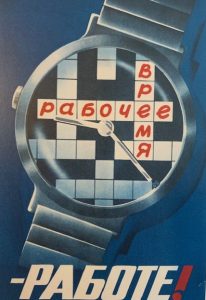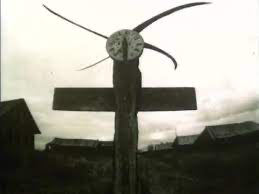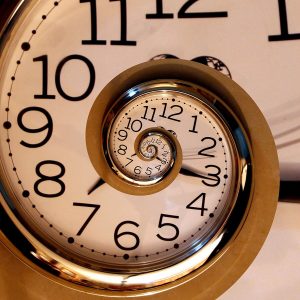Soviet Temporalities Study Group
Introduction
The Soviet Temporalities Study Group critically explores conceptions of time which were developed during the Soviet period. In the years following the October Revolution in 1917, a future-oriented outlook dominated politics and social life. The period between the 1960s and the late 1980s—widely known today as the ‘era of stagnation’—saw a dramatic shift in attitudes towards time and history. Many people and social groups shared a feeling of being stuck in the Soviet system and its bureaucratic structures. The immutability of that system generated a sense of time unique to late socialism: an eternal present. However, it was precisely during that allegedly stagnant present that eclectic notions of repetition, emptiness, impermanence, circularity, ritual and death surfaced in late Soviet culture and thought. In turn, the engagement with such notions, especially in artistic underground circles, produced a dynamic multitude of co-existing temporalities. Those temporalities were expressed in the philosophy, art and science of that time, circulating both through official channels and samizdat.
Aims
The aims of the Soviet Temporalities Study Group are threefold. First, to reconstruct the multitude of temporal regimes that existed during the Soviet period. Second, to investigate the extent to which these temporal regimes relate to a shift in how various social groups experienced and made sense of history and time. Finally, to understand how those multiple temporalities, which also shaped the late Soviet underground, are currently being reappropriated by mainstream culture and ideology. In the shadow of Russia’s war on Ukraine, one of the questions that keeps recurring in the group’s discussions concerns the extent to which the multiple temporal regimes and eschatological discourses of late socialism have shaped contemporary culture and politics.
Organisers
Katerina Pavlidi (Postdoctoral Research Fellow, University College Dublin)
Isabel Jacobs (PhD candidate, CEREES, Queen Mary University of London)
If you would like to participate, please email Katerina Pavlidi at katerina.pavlidi@ucd.ie or Isabel Jacobs at i.jacobs@qmul.ac.uk
The Soviet Temporalities Study Group is affiliated to and supported by BASEES
Activities
Late Soviet Temporalities Reading Group
Late Soviet Temporalities is an online reading group which focuses on Soviet theories and artefacts of time. Since its launch in February 2023, it has grown into a vibrant group of people based across five different time zones, who gather every three weeks on Zoom. The group’s participants have discussed texts by Alexandre Kojève, Anzhelika Arthyukh, Evald Ilyenkov, Yuri Mamleev and Boris Groys, among others. They listened to music by Valentin Silvestrov and watched films by Vladimir Kobrin, Chantal Akerman and a collective known as the Necrorealists.
Late Soviet Temporalities critically explores conceptions of time that were developed during the late Soviet period. Between 1964 and 1982, a period labelled as an “Era of Stagnation”, eclectic notions of impermanence, circularity, emptiness, repetition, ritual and death surfaced in Soviet philosophical and artistic discourses. The Reading Group aims to reconstruct how philosophers and artists of the late Soviet underground conceptualised and expressed such notions. We ask how their engagement with temporalities relates to a shift in the ways various social groups experienced and made sense of history and time. Finally, we investigate why such a temporal shift took place and why studying it matters today.
During the academic year 2022-2023, we discussed texts by Alexandre Kojève, Anzhelika Arthyukh, Evald Ilyenkov, Yuri Mamleev and Boris Groys, among others. We listened to music by Valentin Silvestrov and watched films by Vladimir Kobrin, Chantal Akerman and a collective known as the Necrorealists. Based on our discussions of these sources, we discerned a number of factors that shaped the new regimes of time — which we call “late Soviet temporalities” — as well as the time-based cultural products of the underground: the postmodern condition, eschatology, dialectical materialism, Russian mysticism, New Age spirituality, occultism, Orthodox Christianity, non-Western religions and particularly Buddhism, neo-conservatism, and continental philosophy.
Our international and multidisciplinary group aims to globalise and diversify scholarship on the late Soviet period. One way we do that is by emphasising sources from the Caucasus, Central Asia, Siberia, the Baltic states, Ukraine and Belarus, alongside more “canonical” ones from Leningrad and Moscow, and contributions by women.
The group gathers every three weeks on Zoom and the working language is English. Our sessions are interactive and we encourage participants to curate and chair sessions. The group is open to everyone.
Late Soviet Temporalities Reading Group
Schedule
Click here for current and past schedule(s)
Future and Past Events
Click here for future and past events
Shape the Conversation
To join our mailing list, participate in our programme of events, or find out how we can support your research, please contact hss-cerees@qmul.ac.uk
Pitch a new CEREES Group / Pitch a new CEREES Screening / Pitch a new CEREES Collaboration



